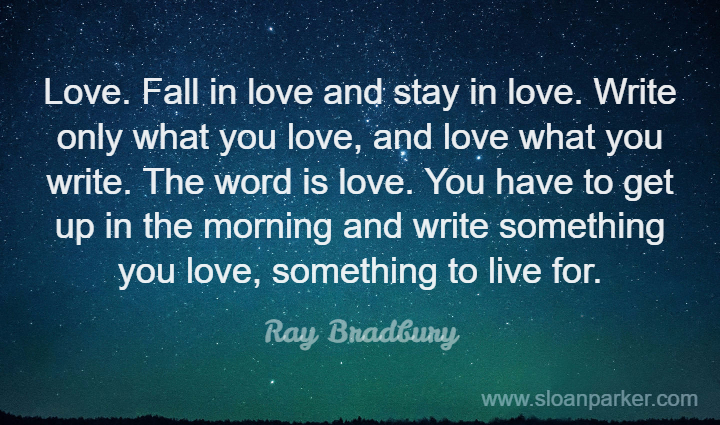
Quote I Love: Love What You Write



The For Writers section of my website has recently been updated. I’ve added the following resources:
I hope some of these resources help other writers out there. My plan is to add more of my own original articles, author resource recommendations, and tools for writers soon, so be sure to check back in with my writing resources page in the coming weeks.
Whenever I write a scene, I picture the setting in my mind, whether it’s a room or an outdoor wilderness locale or a bustling city street, with as much detail as possible. Then I describe one or two specific, concrete elements to give the reader a sense of the place, which is often more effective than describing every detail.
Usually I can imagine that setting clearly in my mind, especially if it’s a character’s home or another important place for them. Other times I like to use a real place that I’ve visited as inspiration. When that isn’t possible, I’ll use a stock photography site to gather images. I might describe the setting the way I see it in the photo, or that picture might spark my imagination to go in a completely different direction. If the photos I find seem like a great setting idea but don’t match my current project, I’ll save them for later use.
Here are some of my recent inspiration finds for settings:
The Writing Resources page of my website has been updated with more links to articles and resources that I’ve found helpful or interesting over the past few years.
Two of the additions under the heading “Plotting Methods” are the ones I now use for each book:
Together these articles provide a reminder list of what to include when I’m first laying out the overall plan of a project and help me keep the story focused and powerful, as well as personal to the characters.
I hope these resources are helpful to other writers as well. Best of luck with your storytelling!
The following was originally posted at Loose Ends, but I wanted to share here as well for all my writing followers.
Last year Pixar storyboard artist Emma Coats tweeted 22 rules of storytelling. Now that I’m knee-deep into a first draft again (writing the sequel to my m/m/m menage MORE), I keep going back to some of those tips she mentioned when it comes to the basics of storytelling.
Two of my favorites are:
“Why must you tell THIS story? What’s the belief burning within you that your story feeds off of? That’s the heart of it.” — Emma Coats
“What’s the essence of your story? Most economical telling of it? If you know that, you can build out from there.” — Emma Coats
I think these go hand in hand when writing a first draft. I have to know the basics of what I’m trying to say and I have to be driven to share that story. I believe if the author lacks a passion for writing any particular story, the readers can tell.
When first starting a novel-length book, if I don’t have a firm grasp on the core concept of the story as well as the passion to tell that story, I stumble my way through the first draft, going back over the plot outline and who the characters are at their core until I land on the truth of what I’m trying to say.
Some questions I ask myself:
For me the journey of discovering all this is what makes storytelling such a powerful, enjoyable experience. It may stretch out the process of writing that initial draft, but I think my stories would not be the same (and neither would I) without it.
You can read the full list of Coats’s tweets here:
The 22 rules of storytelling, according to Pixar